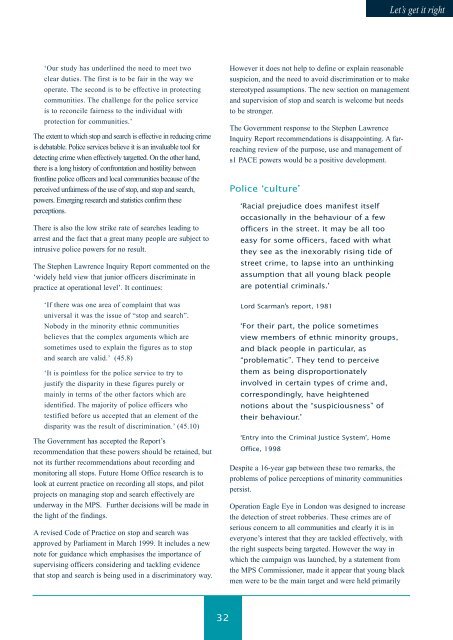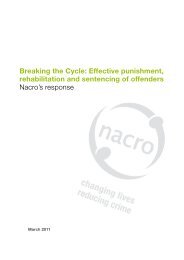Let's get it right: race and justice 2000 - Nacro
Let's get it right: race and justice 2000 - Nacro
Let's get it right: race and justice 2000 - Nacro
- No tags were found...
You also want an ePaper? Increase the reach of your titles
YUMPU automatically turns print PDFs into web optimized ePapers that Google loves.
Let’s <strong>get</strong> <strong>it</strong> <strong>right</strong>‘Our study has underlined the need to meet twoclear duties. The first is to be fair in the way weoperate. The second is to be effective in protectingcommun<strong>it</strong>ies. The challenge for the police serviceis to reconcile fairness to the individual w<strong>it</strong>hprotection for commun<strong>it</strong>ies.’The extent to which stop <strong>and</strong> search is effective in reducing crimeis debatable. Police services believe <strong>it</strong> is an invaluable tool fordetecting crime when effectively tar<strong>get</strong>ted. On the other h<strong>and</strong>,there is a long history of confrontation <strong>and</strong> hostil<strong>it</strong>y betweenfrontline police officers <strong>and</strong> local commun<strong>it</strong>ies because of theperceived unfairness of the use of stop, <strong>and</strong> stop <strong>and</strong> search,powers. Emerging research <strong>and</strong> statistics confirm theseperceptions.There is also the low strike rate of searches leading toarrest <strong>and</strong> the fact that a great many people are subject tointrusive police powers for no result.The Stephen Lawrence Inquiry Report commented on the‘widely held view that junior officers discriminate inpractice at operational level’. It continues:‘If there was one area of complaint that wasuniversal <strong>it</strong> was the issue of “stop <strong>and</strong> search”.Nobody in the minor<strong>it</strong>y ethnic commun<strong>it</strong>iesbelieves that the complex arguments which aresometimes used to explain the figures as to stop<strong>and</strong> search are valid.’ (45.8)‘It is pointless for the police service to try tojustify the dispar<strong>it</strong>y in these figures purely ormainly in terms of the other factors which areidentified. The major<strong>it</strong>y of police officers whotestified before us accepted that an element of thedispar<strong>it</strong>y was the result of discrimination.’ (45.10)The Government has accepted the Report’srecommendation that these powers should be retained, butnot <strong>it</strong>s further recommendations about recording <strong>and</strong>mon<strong>it</strong>oring all stops. Future Home Office research is tolook at current practice on recording all stops, <strong>and</strong> pilotprojects on managing stop <strong>and</strong> search effectively areunderway in the MPS. Further decisions will be made inthe light of the findings.A revised Code of Practice on stop <strong>and</strong> search wasapproved by Parliament in March 1999. It includes a newnote for guidance which emphasises the importance ofsupervising officers considering <strong>and</strong> tackling evidencethat stop <strong>and</strong> search is being used in a discriminatory way.However <strong>it</strong> does not help to define or explain reasonablesuspicion, <strong>and</strong> the need to avoid discrimination or to makestereotyped assumptions. The new section on management<strong>and</strong> supervision of stop <strong>and</strong> search is welcome but needsto be stronger.The Government response to the Stephen LawrenceInquiry Report recommendations is disappointing. A farreachingreview of the purpose, use <strong>and</strong> management ofs1 PACE powers would be a pos<strong>it</strong>ive development.Police ‘culture’‘Racial prejudice does manifest <strong>it</strong>selfoccasionally in the behaviour of a fewofficers in the street. It may be all tooeasy for some officers, faced w<strong>it</strong>h whatthey see as the inexorably rising tide ofstreet crime, to lapse into an unthinkingassumption that all young black peopleare potential criminals.’Lord Scarman’s report, 1981‘For their part, the police sometimesview members of ethnic minor<strong>it</strong>y groups,<strong>and</strong> black people in particular, as“problematic”. They tend to perceivethem as being disproportionatelyinvolved in certain types of crime <strong>and</strong>,correspondingly, have heightenednotions about the “suspiciousness” oftheir behaviour.’‘Entry into the Criminal Justice System’, HomeOffice, 1998Desp<strong>it</strong>e a 16-year gap between these two remarks, theproblems of police perceptions of minor<strong>it</strong>y commun<strong>it</strong>iespersist.Operation Eagle Eye in London was designed to increasethe detection of street robberies. These crimes are ofserious concern to all commun<strong>it</strong>ies <strong>and</strong> clearly <strong>it</strong> is ineveryone’s interest that they are tackled effectively, w<strong>it</strong>hthe <strong>right</strong> suspects being tar<strong>get</strong>ed. However the way inwhich the campaign was launched, by a statement fromthe MPS Commissioner, made <strong>it</strong> appear that young blackmen were to be the main tar<strong>get</strong> <strong>and</strong> were held primarily32

















